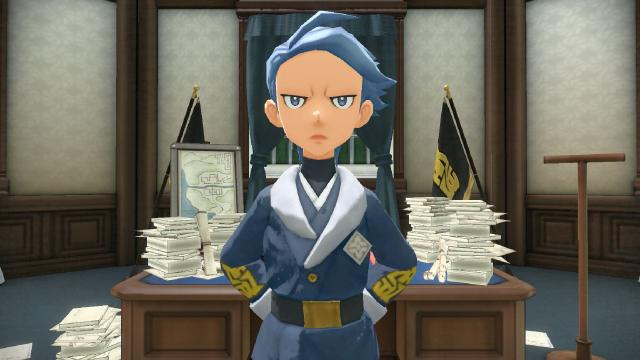For years, Pokémon fans have requested one thing from the series: games that are more adult. (No, not in that way, c’mon!) Recent entries are too easy, longtime players say, or tend to feature plots aimed toward children. The feedback has taken root to the point where Pokémon’s bosses are now openly acknowledging it on the record.
“We hear it. And I think the creators definitely understand that there’s a desire for maybe something,” J.C. Smith, director of consumer marketing at the Pokémon Company, told Axios Gaming’s Stephen Totilo this week. “But we try to focus on making the core accessible to everyone.”
By core, he most likely means those mainline entries, the most recent of which was 2019’s Pokémon Sword and Shield. Next week, Nintendo will release Pokémon Brilliant Diamond and Shining Pearl, two Switch remakes of the 2006 Nintendo DS games (which, by the way, are the best in the series). Typically, mainline entries come out every three or four years. Remakes, like FireRed and LeafGreen (2004 remakes of the first gen-1 games) or HeartHold and SoulSilver (2009 remakes of gen-II), tend to precipitate the flagships by a year or two. Presumably we can expect a new “core” game in a couple of years’ time, but Nintendo hasn’t said a peep about what a potential mainline entry might look like in the future.

But between such tentpoles the venerable series is able to branch into new territory, some of which unequivocally qualifies as “more adult.” One of the surprise hits of 2021 is Pokémon Unite, a DotA-style multiplayer game that has been downloaded more than 25 million times on Switch and mobile devices. Despite the bright colours and overall sprightly Pokémon-itude, Unite is still relentlessly competitive in a way few games aimed toward children are.
And then there’s Pokémon Legends: Arceus, planned for a Switch release on January 28, 2022. We of course don’t know what the not-fully-open-world game will play like, but all early signs point to a game that’s more mature than we’ve come to expect from the series. A horror-inspired trailer last month showed a man (probably) [Definitely – Ed] getting murdered. You’ve also got to grapple with the cold, hard truth that, due to the game’s ancient setting, some of the featured Pokémon are definitely going extinct. And all the humans you meet will have long since died, their contributions to the world mostly forgotten.
Is Pokémon really for “just for kids,” anyway? A 2020 study published in the journal Heliyon pegged the average age of Pokémon Go players at 25. Following the release of Pokémon Sun and Moon in 2016, Nintendo revealed that the duo of 3DS games attracted more players in their 20s and 30s than any entry had previously. The trend is clear: Pokémon players are growing up with these games.
That fact itself sparks something of a cognitive impasse. Were earlier Pokémon games really more challenging than those of today? Or were you just younger, perhaps not fully cognisant of how video games worked?
Debate has roiled over this topic. Some players say how the individual levels of Pokémon have never mattered, so long as you take advantage of type match-ups (i.e., hit a fire-type Pokémon with a water-type for double damage). In older games, people argue, if you pay attention and craft a good team, and you’ll breeze on to the credits. Even the puzzles (like the infamous Snorlax by Lavender Town) aren’t that mystifying. Others have rightfully pointed out the proliferation of internet access since the days of Blue and Red, which itself has spurred a cascade of tips, tricks, guides, and other informational resources that can help players fine-tune their Pokémon rosters.
On the other hand, critics point to the very real features in recent entries like Sword and Shield that make the Pokémon formula, if not “easier,” at least hold your hand a bit more. You can share experience points across your party. You get access to travel options, like running and flying, earlier than in prior games. And there are on-screen indicators that indicate the series’ type match-ups — whether or not an attack will deal half- or double-damage — so you needn’t commit an entire Library of Alexandria’s worth of strengths and weaknesses to memory. Simplification, or quality-of-life improvements? (If we’re talking grown-up themes, though, I’d like to chime in and allot marks to Sword and Shield for tackling heady issues like the imminent global energy crisis.)
So, yeah, to the fans who want this franchise to age things up a bit, Pokémon hears you. Pokémon may have already heard you loud and clear, given some aspects in the recent and forthcoming offerings. Personally, I can’t help but wonder if all this debate is missing the point. Let’s say Pokémon games are geared toward children. Let’s say their storylines have low stakes and predictable conclusions. Let’s say their gameplay is little more than a glorified game of rock-paper-scissors, a criticism you often hear in these conversations. Maybe these games aren’t for adults. Would that be so bad?
To cop from the late, great Fred Rogers, you were a child once. We all were.
